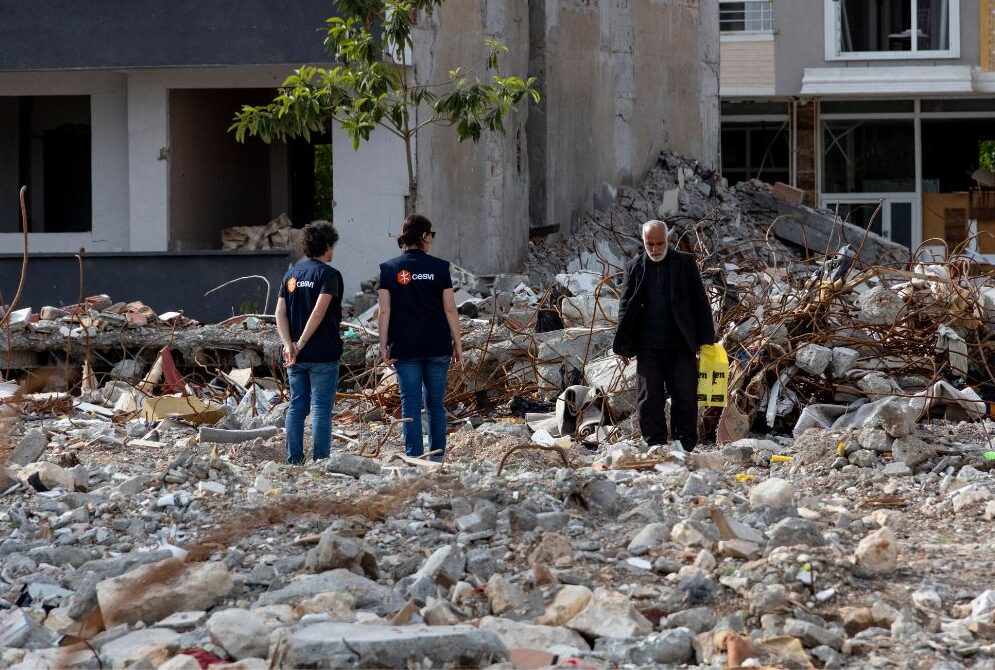Israeli airstrikes and tank fire shook Gaza City overnight as Israel pressed ahead with a large-scale offensive, forcing families to flee while others said they would rather stay and die in their homes.
Witnesses described nonstop explosions from Saturday night into Sunday morning in the neighborhoods of Zeitoun and Shejaia. In nearby Sabra, tanks shelled homes and roads, while buildings were blown apart in Jabaliya to the north. Fires lit up the night sky, spreading fear across the city.
About half of Gaza’s 2 million people now live in Gaza City. A few thousand residents have already left, piling belongings onto cars and rickshaws. But many others remain trapped.
“I stopped counting the times I had to take my wife and three daughters and leave my home in Gaza City,” said Mohammad, 40. “No place is safe, but I can’t take the risk. If they suddenly begin the invasion, they will use heavy fire.”
Some say leaving isn’t an option. Aya, 31, who lives with seven relatives, said they couldn’t afford a tent or even transportation. “We are hungry, afraid and don’t have money,” she said. “We are not leaving, let them bomb us at home.”
Earlier this month, Israel approved plans for a wider assault aimed at seizing control of Gaza City. The military is not expected to push into the destroyed city center for several weeks, leaving a window for Egypt and Qatar to try to revive ceasefire talks. Still, Israeli forces have continued bombing and confirmed renewed fighting in Jabaliya.
On Sunday, Defense Minister Israel Katz vowed to push ahead. Days earlier, he warned Gaza City would be “razed” unless Hamas freed all remaining hostages and agreed to Israel’s terms. Hamas responded that Israel’s plan showed it was not serious about a ceasefire, saying an agreement is “the only way to return the hostages.”
Meanwhile, humanitarian conditions are collapsing. A UN-backed report on Friday warned that famine is already underway in Gaza City and surrounding areas. “This famine is entirely man-made,” it said, urging immediate action to allow aid in. The report warned that without food, water and medical supplies, avoidable deaths will “increase exponentially.”
The Gaza health ministry said Sunday that eight more people had died of starvation, bringing the toll to 289 since the war began, including 115 children.
Israel is facing charges of genocide at the International Court of Justice, where it stands accused of killing more than 60,000 Palestinians. The International Criminal Court has also issued arrest warrants for Prime Minister Benjamin Netanyahu and former defense minister Yoav Gallant. A separate warrant for Hamas’s military chief Mohammed Deif was withdrawn after he was killed.
Adding to the crisis, the Associated Press reported that Israeli troops killed four Palestinians on Sunday as they tried to reach food aid south of Gaza City. Witnesses said soldiers opened fire on a crowd heading toward a distribution site run by the U.S.-backed Gaza Humanitarian Foundation.
“The gunfire was indiscriminate,” said Mohamed Abed, a father of two from Bureij refugee camp. He said people dropped to the ground as shots rang out. Another witness, Aymed Sayyad, said soldiers opened fire when people at the front of the crowd surged forward before the aid site opened.
Neither the Israeli military nor the aid group responded to requests for comment.






